(All rights belong to their owners. Images used here for review purposes only.)
Nana-nin no Sheikusupia, vol. 3, by Harold Sakuishi, Grade B+
This is the final volume of the big book collections of the first Seven Shakespeares series, and clocks in at 458 pages and 1000 yen ($9.50 USD), however, the last 161 pages of that are actually a reprint of the first volume of the second series, Non Sans Droict. While I've been harping on this series being pure historical fiction, the storylines this time are much more speculative than before. The second priest that secretly served Will's parish, John Cottam, had a brother, Thomas that became a Jesuit priest, and had been tortured and killed in the Tower of London. Sakuishi speculates that this was at the direct bequest of Francis Walsingham. Additionally, Sakuishi has Thomas cracking and betraying his brother, who is also then arrested, tortured and killed.
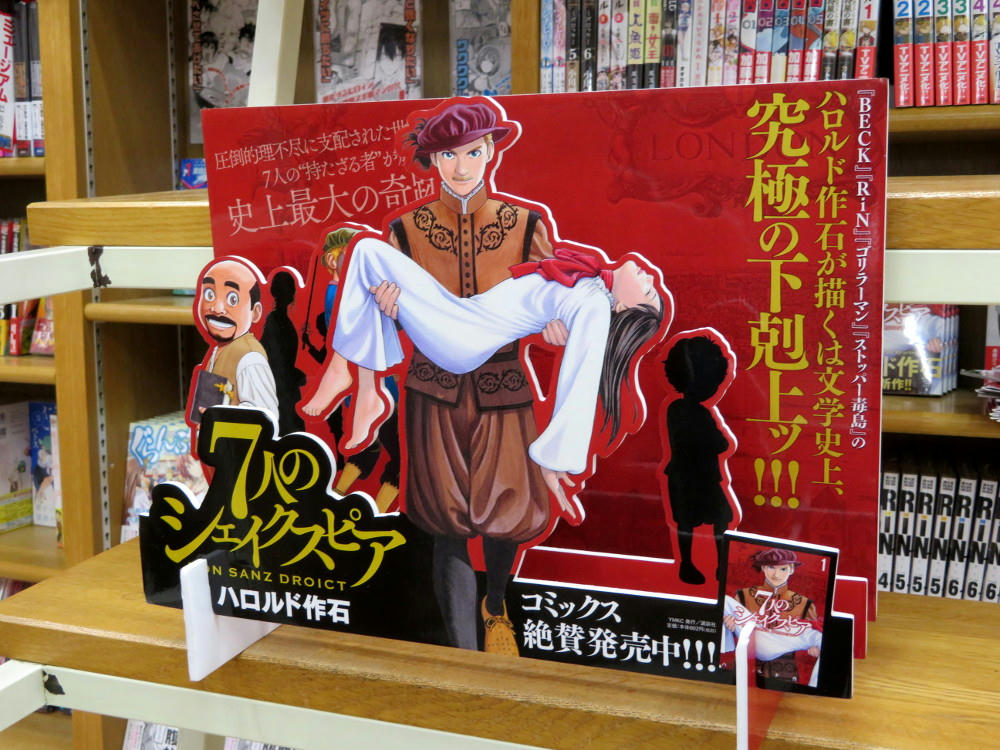
(3D ad board for vol. 1 of the sequel series, discovered at the bookstore.)
Initially, as I was reading through this volume, I got the impression that Sakuishi was deliberately dragging Shakespeare's wife's (Anne Hathaway) name through the mud. But as I was going through the wiki article, I learned that Anne didn't really have that great of a reputation to start with, and that at the beginning of the 20th century several writers had portrayed her in a negative light, and that the marriage was not a happy one at the end. A couple writers had her as cheating on Will, although Arliss Ryan, in the 2010 novel, "The Secret Confessions of Anne Shakespeare" has the two of them going to London together, where Anne turns out to be the real author of Shakespeare's plays (echoing the concept for The Seven Shakespeares). What Sakuishi does that is different from the above-mentioned writers, is to have the 26-year old Anne pregnant with another guy's baby, and then seducing Will in order to force him into a shotgun wedding at age 18 to protect her reputation and marry above her station. She then continues her affair with the guy, Francis, after the marriage. I can't find anything on wiki indicating that there really was an acquaintance named "Francis." Sakuishi also draws Anne to be much uglier than her oil portraits show her to be.
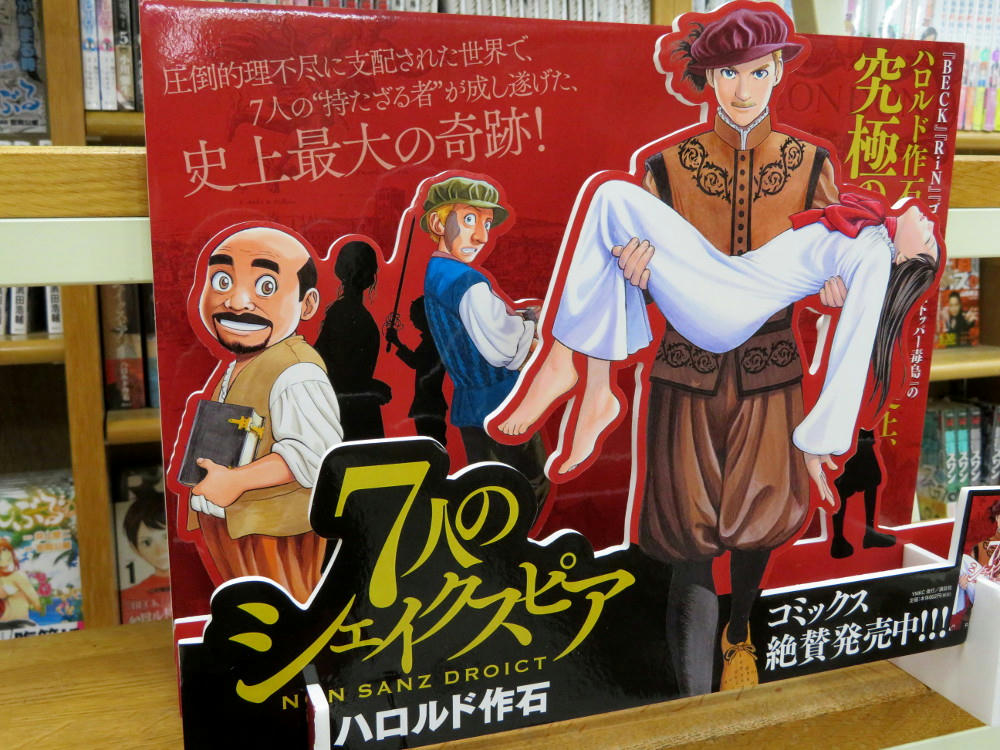
So, the story. John's father, Combe, Sr., tells Cottam that he's learned that Cottam's brother, Thomas, has been captured and is being tortured, so Cottam should leave soon. Cottam won't, saying that he trusts his brother to not crack. The next day, Cottam counsels Will about keeping the faith and recommends that the boy bring his mother to the next service. That night, a messenger hands Cottam a letter from his brother, which had been written in prison, and two strangers watch the exchange to see who Cottam is. The next day, Will gets his mother to attend the service, and right afterward he sees John Cottam being hauled through town in the back of a cart, tied up in a bale of straw. Will chases after the cart to save the priest, but John Combe stops him from incriminating himself in the eyes of the law. Cottam also shakes his head at the boy to keep him away. Cottam is followed by the local magistrate, Thomas Lucy, for sentencing. Nearby in the crowd, Will notices a rather ugly woman who is smiling at the captured Catholic priest, and identifies her as Anne Hathaway. John and Will escape and cry uncontrollably where no one can see them. The Catholics in Stratford-upon-Avon go into a panic, and Combe, Sr., burns all his religious items to reduce the risk of being discovered. Cottam is tortured, but doesn't crack. The narrator says Thomas Cottam was beheaded on May 30, 1582, while his older brother continued to be tortured by Richard Topcliff, director of the secret police.
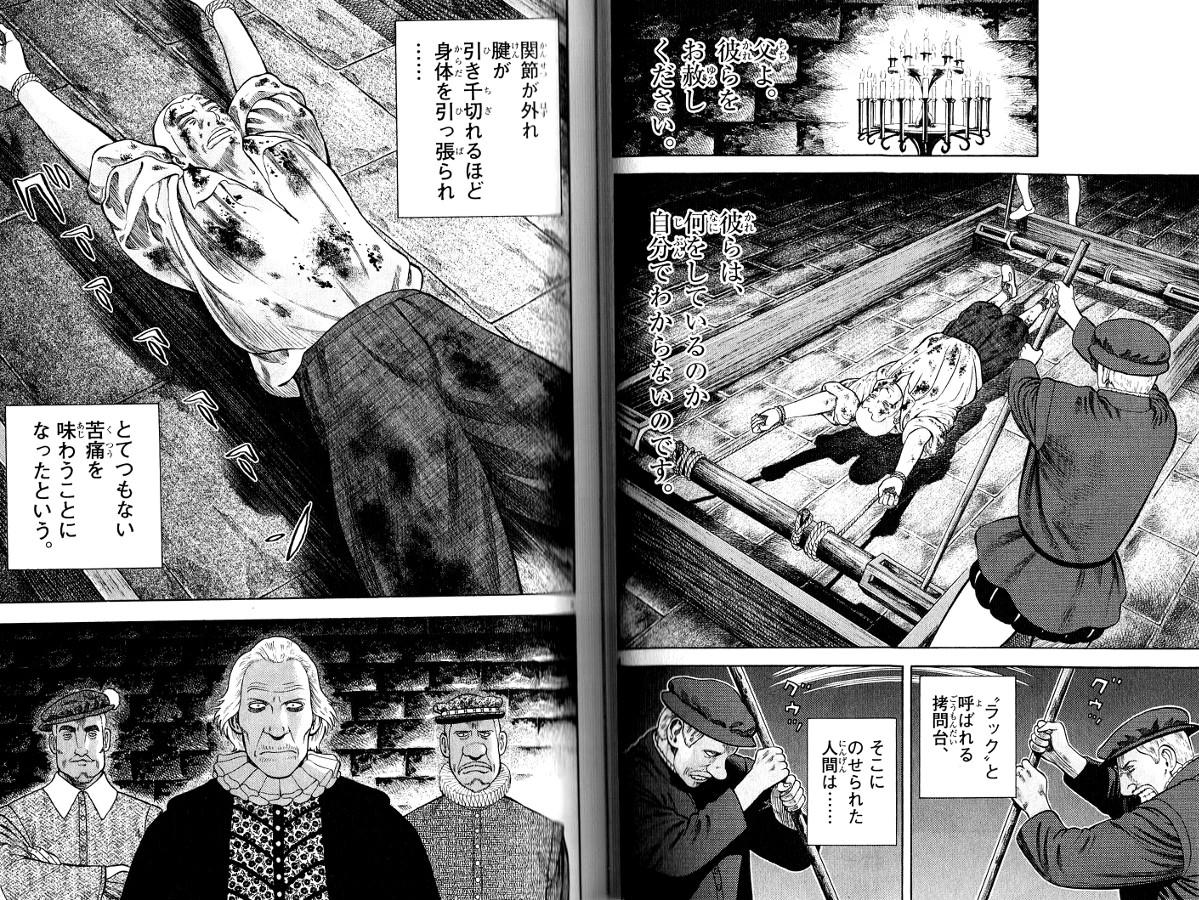
(John Cottam gets captured and tortured for being Catholic.)
The scene changes to Anne Hathaway's family's cottages (in fact, the family was relatively well-to-do, had a large estate, and the building had 12 rooms), where her mother discovers that Anne is pregnant with the baby of a lawyer named Francis. Her mother states that a wealthy man like that isn't going to marry a pauper like her, so they cook up a plan for Bart, a farmhand on the estate, to pick one of his friends to visit her on some pretext. Bart only knows three men, Will, Combe, and one other from school, so he gets the three of them together for a card game, the loser having to visit a "haunted house" for one night. Will is the loser, and Bart takes him out to an empty cottage where Anne is waiting. She seduces the boy and they have sex. The next day, Combe asks what happened, but Will is still in shock and can't talk about it. Some time passes, and one day Anne and her mother visit Will's father to accuse the boy of making Anne pregnant. John Shakespeare has seen this kind of manipulation before and is very fatalistic about it. Will decides to do "the right thing" and he marries her in a quiet ceremony in a small Protestant church. After the baby is born, Will becomes extra busy with his glove-making business, plus caring for the baby. One morning, Anne says the baby, Suzanne, named after her mother, is running a slight fever and she wants to take her to the doctor. Actually, she visits Francis to show off their new child. Francis likes the current situation, and the two of them have sex again.
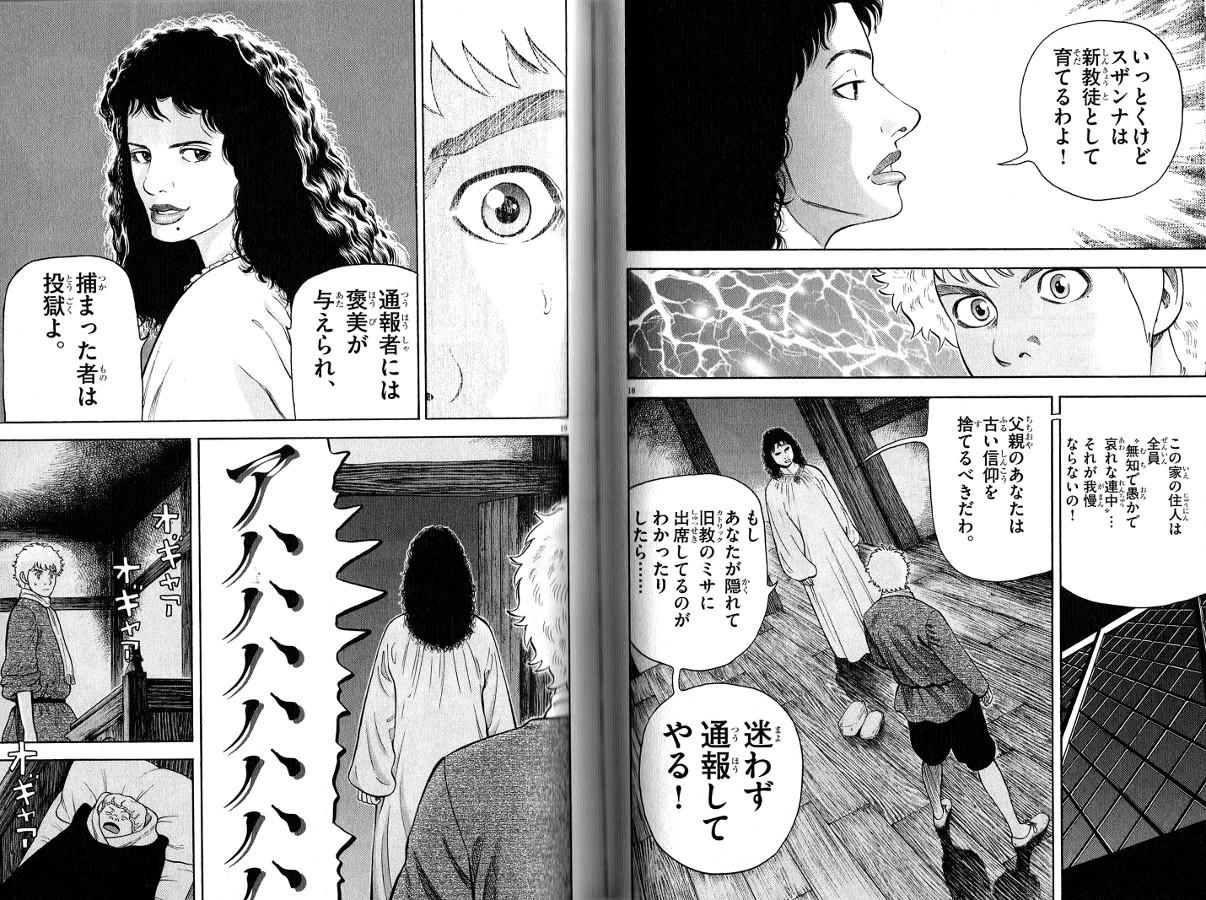
(Anne Hathaway marries Shakespeare, then tells him to get rid of his rosary, for the sake of "their" baby.)
Later, Will and John Combe are walking through town when they come across a crowd in front of an old man locked up in the stocks. The crowd jeers him as he protests his innocence, When Will gets home, he discovers that Anne has found his rosary, and she tells him to get rid of it for the sake of "their" baby lest the authorities find out about it. As she leaves the room, her laughter is like the braying of a donkey. The narrator says that at age 19, Will's life is about to get worse. One night, a pair of poachers steal two deer from Thomas Lucy's lands (they turn out to be two of Lucy's guards). The next day, Lucy notices that his herd is smaller by two deer. His personal Protestant priest tells him that this must be the work of the Catholics, and that he needs to punish them quickly or they'll get out of control. Lucy orders his deputy, Scales, to bring the culprits to justice. Scales, a thin older guy with a goatee and bowl haircut, orders his men to scour the lands and locate the poachers. One of the men is a dolt that decides on pick on Roger, the kid who had lost his leg to Lucy's dogs 5 years earlier. Will and John Combe just happen to be visiting Roger's family at the time, and they point out that Roger is in no condition to poach anything. Unfortunately, the dolt notices that Will smells like tanned leather (from his work making gloves), so he gets revenge by telling Scales that the two young men are the poachers.
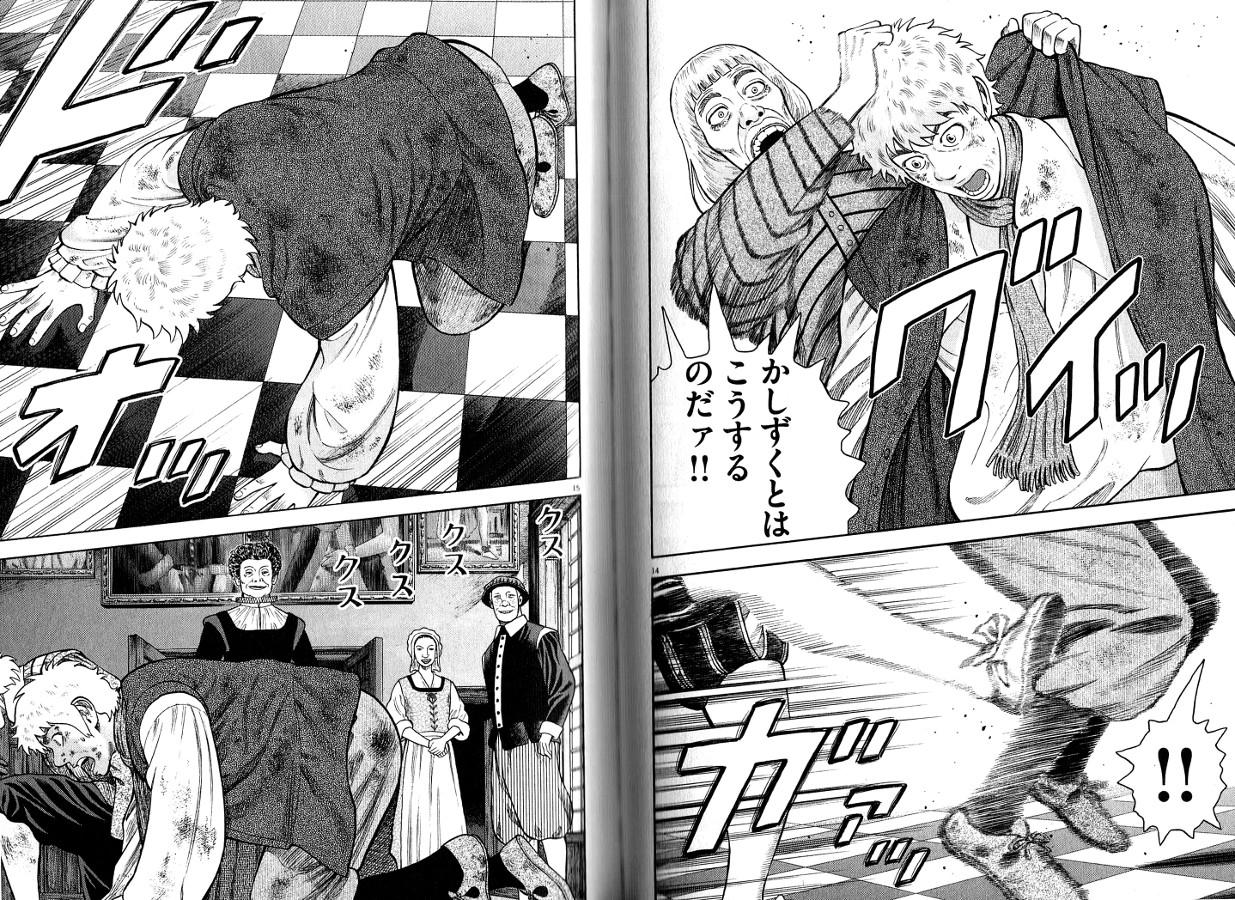
(Will gets punished for not bowing in front of Thomas Lucy fast enough.)
The next day, Lucy's guards swoop down on Stratford-Upon-Avon and arrest both Will and Combe. They're paraded through town, to the jeers of the townspeople. They're thrown into a dungeon cell and time passes. Will cracks, and wants to know why this is happening to him. Combe is more stoic, having been punished mercilessly by his father before, and he just bides his time. They pray a lot, and wait. At one point, Will tries writing bible verses on the wall with his fingernail, and in blood, and Combe stops him. Meanwhile, Scales' deputy is having second thoughts about the boys' guilt, and tries to get Scales to renew the investigation, but the guy only cares about whether Lucy is happy with SOMEONE being punished, or not. Combe, Sr., makes several visits to the Lucy estates, and eventually bribes Scales enough to get him to talk Lucy into freeing his son and his friend. The dolt guard ushers Will and John into the main mansion, where they're overwhelmed by the wealth Lucy controls. Will is a little too slow in showing his respect to Lucy and his wife, so the guard slams him to the ground. Will tries to argue that he's innocent (just as the guy in the stocks had), and claims that his father is a Gentleman, and therefore the Shakespeare family should receive some respect in return. Lucy just stares at the boy, saying that there are only two kinds of people - the nobility, and the trash. Will is trash. However, he is free to go, still retaining the stigma of being a poacher.
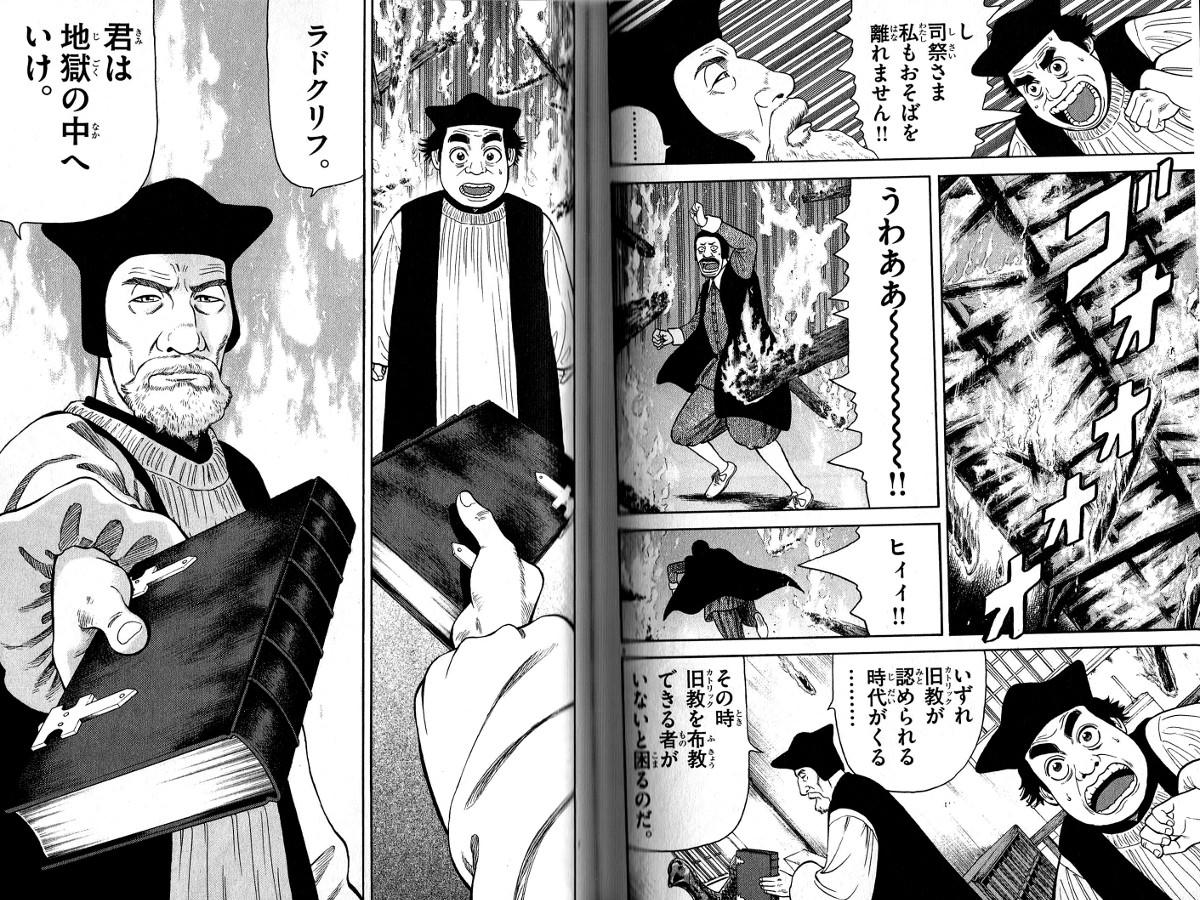
(Radcliffe's church goes up in flames, and Father Bell gives him a Bible, saying that he's going to find himself in the middle of Hell for his faith soon.)
When Will and Combe get back to town, the townspeople continue to deride them as criminals. John goes to his father and asks for permission to move somewhere else and start up his own trade business. Combe, Sr., acquiesces, and the boy promises to pay back the money owed for springing him from prison. He and Will pack up quietly and disappear in the night (Anne feels sorry for herself for having married into an unlucky family). Before leaving, the two boys vow to dedicate themselves to searching for freedom. Will gives John a present of a new pair of black gloves, while John gives them new names. Will initially likes "Lance Carter," then changes his mind and tries to take "Hughes Worth" instead (John wants to be Hughes himself). They travel on foot for several days in the rain, and are so filthy when they get to Lancaster that all the inns refuse to accept them as guests. "Hughes" faints from lack of food, so Will seeks out the source of a lantern light, and discovers a diminutive priest crouched in front of a hole filled with Catholic artifacts and broken pieces of stained glass windows. The priest, Thomas Radcliffe, acts like he's trying to bury the stuff under a pile of dirt, but it's clear that while he's dressed as a Protestant, both he, and the rest of the clergy in this church, are Catholics that are trying to avoid persecution under the current law. Will grabs one of the pieces of glass out of the hole, and cuts himself on it. Radcliffe persuades him to hand the glass over, and then bandages the wound, lets the boys stay overnight in the church, and serves them bread and soup for dinner (the best meal they've ever eaten).
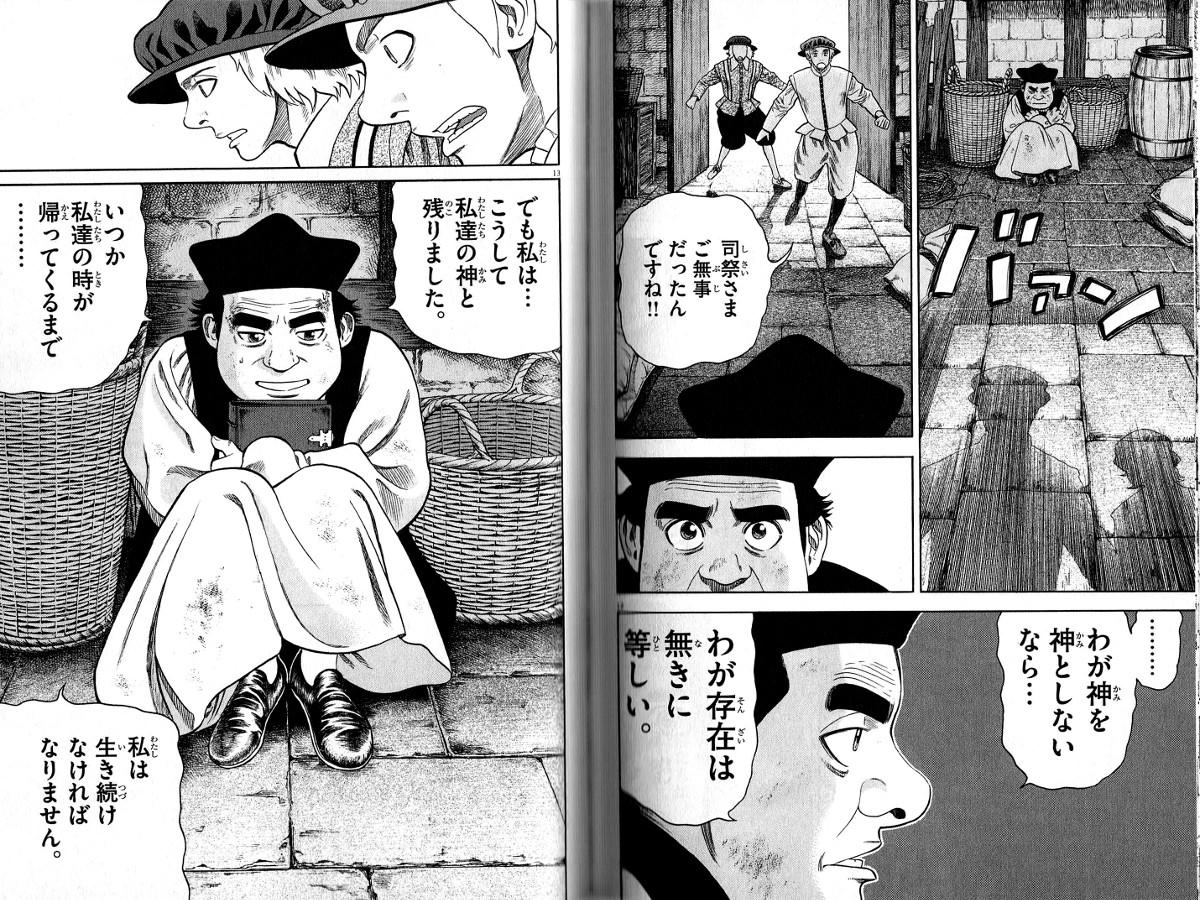
("Hughes" and "Lance" find Radcliffe huddled in a shed behind the church.)
The next day, Radcliffe lets them get cleaned up, listens to their story, then writes a letter of recommendation to Walker, the sugar and salt dealer in Liverpool. As the boys get ready to leave, they meet the other priests of the church, led by Father Bell, who are also secret Catholics. The boys get to Liverpool and find Walker in the middle of a wrestling contest with his men. He gets one of the bigger guys to wrestle Lance, who loses three out of three falls. But, Walker greatly respects Radcliffe, and he gives Hughes the task of selling salt in town, and eventually has Lance selling sugar. Unfortunately for Hughes, a rival salt distributor, Johnson, already controls the salt distribution in Liverpool, and Hughes gets roughed up and no one buys anything from him. On the other hand, there's less control over sugar, and Lance makes a killing selling sugar to the Johnson household, so Walker decides to take on both boys and teach them the trade. Meanwhile, Bell and the other priests are coming under additional pressure from the Protestant government and they're trying to decide whether to run or stay their ground. Bell wants to stay, and Radcliffe, who has a reputation as being the most devote, best educated Catholic priest in the region, also wants to stay. One of the other priests, Malta, had been taken into the Church by Bell as a runaway, and he has greater misgivings. A little later, another priest, who's no taller than Radcliffe, runs up to the church with a warning that government forces are closing in on them, and said forces do arrive. Malta, who is in the belfry of the church, freezes up, accidentally dropping a candle onto the forbidden church records stored there, and starts a fire that eventually consumes the building. Bell gives Radcliffe a Catholic bible and tells him to go into hiding until the environment for Catholicism improves.
Bell and most of the other priests allow themselves to die in the flames. Lance and Hughes happen by to thank Radcliffe for helping them, and they discover the man cowering in a shed behind the church, clutching the bible. Malta is captured by the government troops, and he tells them that his name is Thomas Radcliffe. They arrest Malta for the time being. The government takes Bell's charred corpse and hangs it by the neck in a noose in the public square in order to ridicule the Catholics. Radcliffe joins Lance and Hughes in their carriage, and they talk him into changing his name to Milo and joining them on their paths to new lives of freedom.
The story returns to the "present" (1588), with a brief foray into the story of Mary, Queen of Scots, along the way. Mary is portrayed as a nasty, power-hungry woman that tried to raise a rebel army against Queen Elizabeth and was finally beheaded in 1587. Over in Spain, King Philip II had been hoping to put a Catholic Queen on the throne, and the death of Mary destroyed those plans. With Elizabeth, a Protestant, wearing the crown, Philip changed tactics and put together an armada to invade the country. With this background, Hughes tells Lance that Liverpool is becoming too dangerous for sea-based merchants and he has changed his mind and wants to go to London, too. That just leaves Milo as the sole holdout. One day, when Lance, Hughes and Li are out in a carriage, with Hughes telling Lance about Philip II, Li gets out of the carriage and gives Lance advice about a woman living in a huge mansion nearby. The woman is pregnant, craves sugar, and is having trouble sleeping. Lance makes a big sugar sale, and guarantees her as a customer for life by giving her herbs that will help her sleep at night. Hughes and Lance figure that with Li on their side, they'll have nothing to worry about in London. Some time later, Hughes comes racing up to the house on a horse, yelling for everyone to gather together in a darkened room. Yang, the priest that had warned Father Bell of the impending government raid, has been found. The government forces have been approaching Liverpool, and a family of practicing Catholic Gentlemen were arrested and hanged in public (not sure if Yang was hanged as well or not). Now that Milo/Radcliffe's life is in clear danger, everyone agrees to leave immediately for London. The rest of the book is then the first volume for the sequel series, where the group sets themselves up in London.
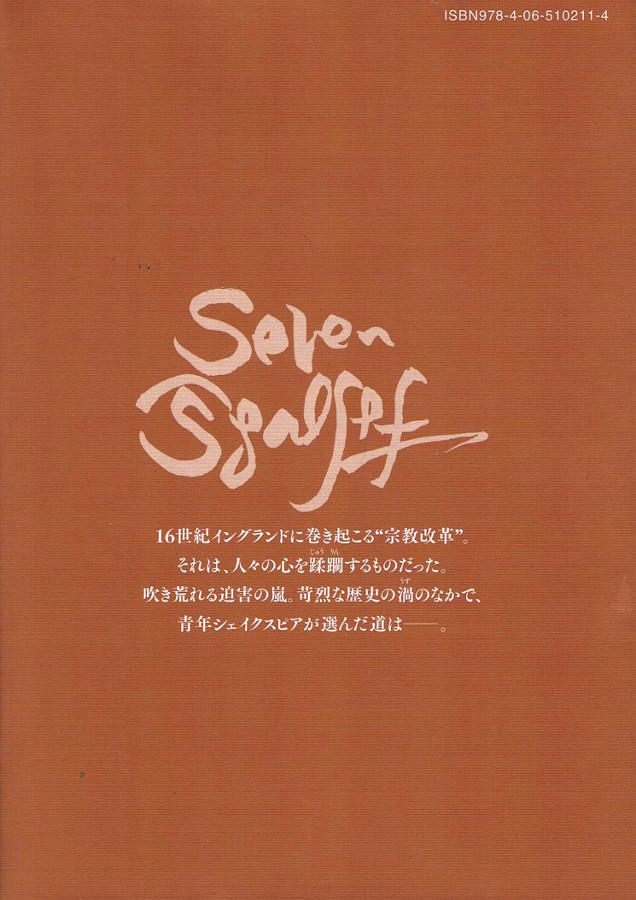
Summary: Well, I now know what everyone's background is, why they have fake names, and why Lance was working for a salt merchant when he finally started writing morality plays to be performed for the Protestant Church. I don't really like the liberties taken in the negative portrayals of Mary, Queen of Scots, and Anne Hathaway, and Shakespeare/Lance Carter is treated as either being too shrewd or too naive as the story requires it. The character designs are erratic, and in the middle of this volume, both Will and John Combe are drawn as to be completely unrecognizable (there may have been a change in Sakuishi's studio assistants). I'm not a big fan of historical fiction, although I do like seeing all the architectural and background pictures. Having Li as a prophetess and master sonnet writer kind of undermines the believability of the story premise as well. I probably won't continue reading the sequel, Non Sans Droict, in part because book prices are starting to get too expensive. Anyway, the series is recommended to anyone that likes this kind of thing.
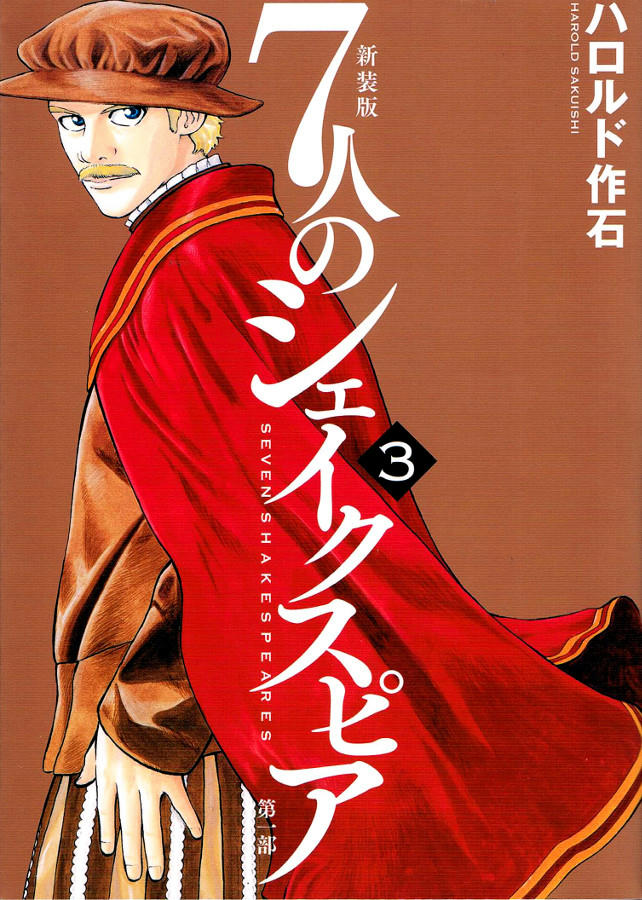




No comments:
Post a Comment